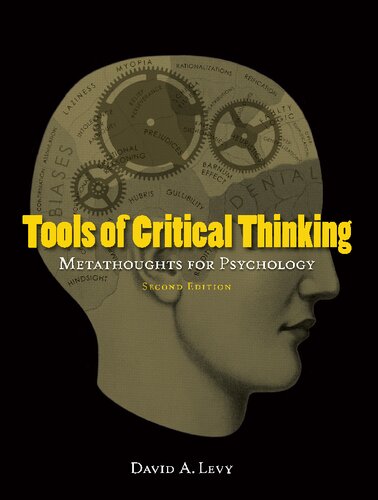

Most ebook files are in PDF format, so you can easily read them using various software such as Foxit Reader or directly on the Google Chrome browser.
Some ebook files are released by publishers in other formats such as .awz, .mobi, .epub, .fb2, etc. You may need to install specific software to read these formats on mobile/PC, such as Calibre.
Please read the tutorial at this link. https://ebooknice.com/page/post?id=faq
We offer FREE conversion to the popular formats you request; however, this may take some time. Therefore, right after payment, please email us, and we will try to provide the service as quickly as possible.
For some exceptional file formats or broken links (if any), please refrain from opening any disputes. Instead, email us first, and we will try to assist within a maximum of 6 hours.
EbookNice Team

Status:
Available4.5
14 reviews
ISBN 10: 1577666291
ISBN 13: 9781577666295
Author: David A Levy
This innovative text is designed to improve thinking skills through the application of 30 critical thinking principles—Metathoughts. These specialized tools and techniques are useful for approaching all forms of study, inquiry, and problem solving. Levy applies Metathoughts to a diverse array of issues in contemporary clinical, social, and cross-cultural psychology: identifying strengths and weaknesses in various schools of thought, defining and explaining psychological phenomena, evaluating the accuracy and usefulness of research studies, reducing logical flaws and personal biases, and improving the search for creative solutions. The Metathoughts are brought to life with practical examples, clinical vignettes, illustrations, anecdotes, thought-provoking exercises, useful antidotes, and contemporary social problems and issues. Tools of Critical Thinking, 2/E is primarily suited as a core textbook for courses in critical thinking/problem solving, or makes an ideal supplement in a wide variety of undergraduate and graduate psychology courses, including introductory psychology, abnormal psychology (psychopathology), cross-cultural psychology, theories and methods of psychotherapy, research methods and design, theories of personality, clinical practicum, and contemporary problems and issues in psychology.
Part One: Conceptualizing Phenomena
Chapter 1: I. The Evaluative Bias of Language: To Describe Is to Prescribe
Chapter 2: II. The Reification Error: Comparing Apples and Existentialism
The Reification of Theory
Chapter 3: III. Multiple Levels of Description: The Simultaneity of Physical and Psychological Event
Chapter 4: IV. The Nominal Fallacy and Tautologous Reasoning: To Name Something Isn’t to Explain I
The Nominal Fallacy
Tautologous Reasoning
Chapter 5: V. Differentiating Dichotomous Variables and Continuous Variables: Black and White, or Sh
Theoretical and Clinical Applications
Chapter 6: VI. Consider the Opposite: To Contrast Is to Define
Chapter 7: VII. The Similarity-Uniqueness Paradox: All Phenomena Are Both Similar and Different
Sources of Error
Chapter 8: VIII. The Naturalistic Fallacy: Blurring the Line between “Is” and “Should”
Application 1: Evolutionary Psychology
Application 2: Maslow’s Theory of Self-Actualization
Application 3: Erikson’s Theory of Healthy Ego Functioning
Caveat and Conclusion
Chapter 9: IX. The Barnum Effect: “One-Size-Fits-All” Personality Interpretations
Part Two: Explaining Phenomena
Chapter 10: X. Correlation Does Not Prove Causation: Confusing “What” with “Why”
Superstitions, Magical Thinking, and the Contiguity-Causation Error
Chapter 11: XI. Bidirectional Causation: Causal Loops, Healthy Spirals, and Vicious Cycles
Chapter 12: XII. Multiple Causation: Not “Either/Or,” but “Both/And”
Advanced Applications of Multiple Causation: Linear and Nonlinear Combinations
Chapter 13: XIII. Degrees of Causation: Not All Causes Are Created Equal
Chapter 14: XIV. Multiple Pathways of Causation: Different Causes, Same Effect
Part Three: Common Misattributions
Chapter 15: XV. The Fundamental Attribution Error: Underestimating the Impact of External Influences
Chapter 16: XVI. The Intervention-Causation Fallacy: When the Cure Doesn’t Prove the Cause
Chapter 17: XVII. The Consequence-Intentionality Fallacy: The Effect Doesn’t Prove the Intent
Chapter 18: XVIII. The “If I Feel It, It Must Be True” Fallacy: The Truth Hurts; But So Do Lies
Comfortable Truths
Comfortable Falsehoods
Uncomfortable Truths
Uncomfortable Falsehoods
Chapter 19: XIX. The Spectacular Explanation Fallacy: Extraordinary Events Do Not Require Extraordin
Part Four: Investigating Phenomena
Chapter 20: XX. Deductive and Inductive Reasoning: Two Methods of Inference
Deductive Reasoning
Inductive Reasoning
Solutions and Applications
Chapter 21: XXI. Reactivity: To Observe Is to Disturb
Chapter 22: XXII. The Self-Fulfilling Prophecy: When Expectations Create Reality
Chapter 23: XXIII. The Assimilation Bias: Viewing the World through Schema-Colored Glasses
Diagnostic Labels as Schematic Filters: The Assimilation of Psychopathology
Chapter 24: XXIV. The Confirmation Bias: Ye Shall Find Only What Ye Shall Seek
The Confirmatory Bias of Theoretical Orientations
The Confirmatory Bias of Projective Psychological Testing
Chapter 25: XXV. The Belief Perseverance Effect: The Rat Is Always Right
Chapter 26: XXVI. The Hindsight Bias: Predicting a Winner after the Race Is Finished
Part Five: Other Biases and Fallacies in Thinking
Chapter 27: XXVII. The Representativeness Bias: Fits and Misfits of Categorization
Systematic Sources of Error
Chapter 28: XXVIII. The Availability Bias: The Persuasive Power of Vivid Events
Chapter 29: XXIX. The Insight Fallacy: To Understand It Isn’t Necessarily to Change It
Benefits of Insight
Limitations of Insight
Part Six: Conclusions
Chapter 30: XXX. Every Decision Is a Trade-Off: Take Stock of Pluses and Minuses
“To Diagnose or Not to Diagnose?”
“To Metathink or Not to Metathink?”
Meta-Metathoughts
Epilogue: Concluding Meta-Metathoughts
To the Psychology Student
To the Psychology Classroom Instructor
To the Psychotherapist
To the Psychological Researcher
To Students and Instructors in Other Fields of Study
Metathoughts Summary and Antidote Table
tools of critical thinking levy pdf
the critical thinking toolkit pdf
tools of critical thinking metathoughts for psychology pdf
critical thinking tools for taking charge
critical thinking toolkit
the critical thinking toolkit
a guide to critical thinking
Tags: David A Levy, Critical, Thinking